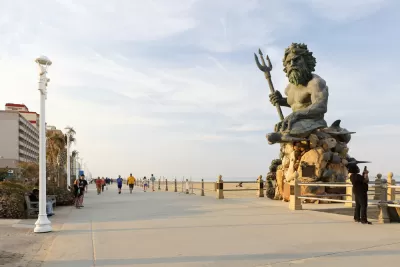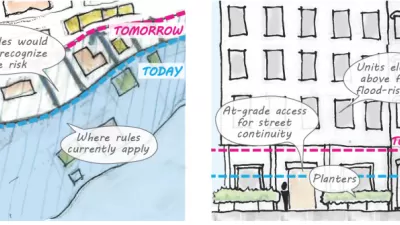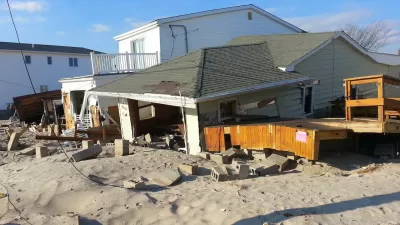Only a few places have managed to stem the tide of development in areas at risk to the effects (like wildfire and flooding) of climate change. Virginia Beach is an early test bed for what it takes to tell developers "no."

Christopher Flavelle and John Schwartz report from Virginia Beach, where the city recently became a leader in climate-aware development restrictions—i.e., saying no to developers proposing buildings on land at risk of flooding from sea-level rise and extreme weather.
The city last year became one of a small but growing number of communities willing to say no to developers — despite their political and economic clout — when it rejected a proposal to build a few dozen homes on this soggy parcel of 50 acres, arguing that those homes would be unsafe. The developers sued, accusing officials of making their project a scapegoat as voters clamored for action after disastrous flooding.
This past May, a judge ruled that Virginia Beach was within its rights to stop the development. The city’s experience could become a harbinger for others nationwide.
According to the article, the confrontation between Virginia Beach and this developer is emblematic of many future, similar conflicts, the outcomes of which will determine the vulnerability of Americans to climate change in the future. The recent track record of this conflict has favored developers and introduced risk to many communities:
In many coastal states, homes are going up at the fastest rate in the most flood-prone areas. The number of new houses in what experts call the wildland-urban interface, where the wildfire threat tends to be greatest, increased 41 percent nationwide between 1990 and 2010.
A recent report from the Pew Charitable Trusts provides additional background for the this feature-length story. The "Mitigation Matters: Policy Solutions to Reduce Local Flood Risk" report is available online.
FULL STORY: As Climate Risk Grows, Cities Test a Tough Strategy: Saying ‘No’ to Developers

Maui's Vacation Rental Debate Turns Ugly
Verbal attacks, misinformation campaigns and fistfights plague a high-stakes debate to convert thousands of vacation rentals into long-term housing.

Planetizen Federal Action Tracker
A weekly monitor of how Trump’s orders and actions are impacting planners and planning in America.

In Urban Planning, AI Prompting Could be the New Design Thinking
Creativity has long been key to great urban design. What if we see AI as our new creative partner?

Florida Seniors Face Rising Homelessness Risk
High housing costs are pushing more seniors, many of them on a fixed income, into homelessness.

Massachusetts Budget Helps Close MBTA Budget Gap
The budget signed by Gov. Maura Healey includes $470 million in MBTA funding for the next fiscal year.

Milwaukee Launches Vision Zero Plan
Seven years after the city signed its Complete Streets Policy, the city is doubling down on its efforts to eliminate traffic deaths.
Urban Design for Planners 1: Software Tools
This six-course series explores essential urban design concepts using open source software and equips planners with the tools they need to participate fully in the urban design process.
Planning for Universal Design
Learn the tools for implementing Universal Design in planning regulations.
Gallatin County Department of Planning & Community Development
Heyer Gruel & Associates PA
JM Goldson LLC
City of Camden Redevelopment Agency
City of Astoria
Transportation Research & Education Center (TREC) at Portland State University
Jefferson Parish Government
Camden Redevelopment Agency
City of Claremont





























